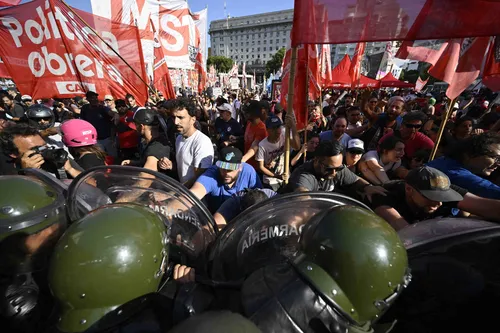
Social movements protested in front of the National Congress this Wednesday (31) against the ultraliberal package of the president of Argentina, Javier Milei. On this day, deputies begin discussions to approve the so-called Bus Law, a bill announced by the head of the Executive. More than 100 articles have already been discarded by congressmen.
Police officers clashed with protesters around 5:30 p.m. Milei’s government deployed police officers from national security and the Buenos Aires Infantry Corps. Protesters occupied the Congress square, in front of the Legislative headquarters.
🔴NOW: the police advance on the protesters
📍 Congress.
🗣️ @martincandalaft
👉 Follow in #WhoWhenWhere
📺 https://t.co/3gt6dzr3tG pic.twitter.com/4Tya7IqPjc
— A24.com (@A24COM) January 31, 2024
With the increase in the number of people, the event occupied Entre Ríos Avenue. To comply with Milei’s “anti-picketing” protocol, the police surrounded the protesters, preventing them from staying in the street. For political scientist Diego Reinoso, professor at the University of San Andrés, the movement of security agents was exaggerated, given the peaceful and numerous nature of the act.
Protesters began arriving at Congress Square around noon, calling for the package to be revoked. The session is expected to last at least 30 hours. Therefore, the Classist Union Coordination and Polo Obrero announced activities to be carried out throughout the day and the convening of popular assemblies in Buenos Aires
In an interview with TeleSur, Eduardo Belliboni, leader of the Polo Obrero movement, said that the demonstrations will last until the end of the vote. According to him, Milei’s plan is a setback for the country.
“Everything they are negotiating to reject from the Bus Law is to eliminate issues that affect sectors such as agro-exports. Here we have to understand that there is a plan by Milei to set this country back, where workers have no rights and agro-exporters earn more. The industry did not develop, the productive country did not develop, only the agro-export part”, he stated.
According to Reinoso, this Wednesday’s mobilization was mainly driven by left-wing sectors and did not have an organization from broad sectors of Peronism.
“The demonstrations are more general against government policies and not just what is proposed in the Bus Law. They represent dissatisfaction with the government’s general policies”, said the professor to the Brazil in fact.
What the ultraliberal package proposes
The Bus Law attempts to legislate on all social, political and economic aspects of the country. The original text, among other things, determined:
1. Massive delegation of legislative powers to the Executive Branch, for two years, extendable to four. This was negotiated and it appears that it would be for less time, for a year.
2. Privatization of all public companies, without exceptions. Included are companies that had been excluded in the 90s, such as Banco Nacional. This was negotiated and would now not include major companies like YPF.
3. Criminalization of social protest at unprecedented levels since the return of democracy.
4. Energy deregulation and liberalization: oil, gas, biofuels and electricity.
5. Removal of criteria established after the 2001 default to prevent new fraud with public debt.
6. Elimination of the Sustainability Guarantee Fund, something that harms retirees;
7. Tax reduction for the richest.
During the debate in Congress, Congresswoman Myriam Bregman was harassed while speaking in the rostrum of honor. A man identified as Tomás Agote, a businessman and member of the La Libertad Avanza party, shouted a series of insults at the former presidential candidate. He was expelled from the session.
Editing: Rodrigo Durão Coelho
Source: www.brasildefato.com.br

